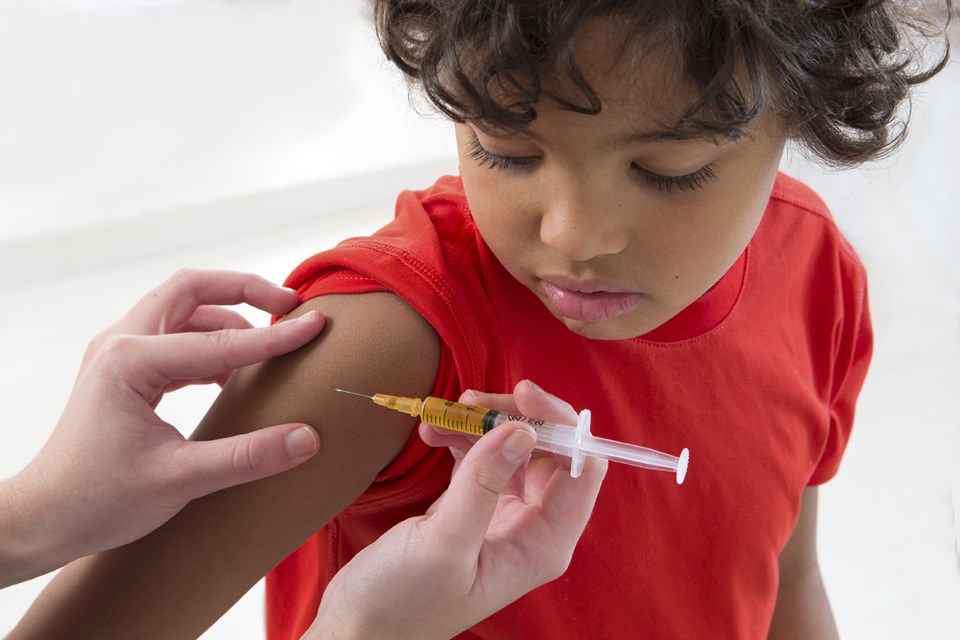The discussion of vaccinations among parents of young children is often a heated debate in Squamish.
Just before students go back to school, the Canadian Medical Association added fuel to the fire last week at its annual general meeting when it passed a resolution that called on provincial governments to authorize schools to require parents to provide proof of their child’s immunization status. The organization of Canadian doctors also called for public health officials to talk to parents if their children’s vaccines are not up to date.
At the same meeting, however, the delegates also voted against a national program to compensate those who suffer the rare injuries that may be caused by the vaccines, thus likely stoking the fire for the anti-vaccine movement.
In B.C., the provincial government currently does not require parents to vaccinate or show proof of vaccinations in order to enrol in school.
Approximately 68 per cent of children born in 2011 in B.C. were fully immunized by their second birthday, according to a 2014 B.C. Centre for Disease Control report.
“B.C. does not require mandatory immunization of school-aged children, and we’ve have had strong success without this type of legislation,” Hannah Lawrie, senior public affairs officer with the provincial ministry of health, said in an email.
Lawrie also noted provincial medical health officers have the ability to order non-vaccinated children to stay home from school during outbreaks, if needed.
The school district defers to the provincial ruling on the matter and works with Vancouver Coastal Health (VCH) in trying to gather vaccination information, according to Jody Langlois, assistant superintendent for the Sea to Sky School District. Langlois added that in kindergarten or when a student transfers into the district, parents are asked to fill out a VCH vaccination record form.
This time last year, in the midst of a measles outbreak in the Fraser Valley, the health authority issued an alert to parents in the corridor to ensure their child’s vaccinations were up to date.
For those parents who do not vaccinate their children, there is judgment and shaming, according to Squamish mom Juliette Woods.
“It can be an awkward look, a meme posted on Facebook, or as intense as bullying, fear-mongering and direct shaming,” she said. “Conscientious objectors must defend against claims that we haven’t done our research, unvaccinated children harm the vaccinated population, stories of those with compromised immunity getting sick from an unvaccinated kid, that a possible autism link is our only concern.”
Woods said she started doing research on vaccines about 12 years ago when she felt pressure from her child’s school to vaccinate. She looked up all the ingredients in the vaccines and found many ingredients are of concern to vegetarians, those with severe allergies and certain religious faiths, she said.
She then researched the illnesses against which the vaccines were supposed to protect.
“I explored what the illnesses actually were, were they mostly ‘nuisance’ illnesses with rare complications or the mass killers many believe,” she said. “I found the medical reporting system for these statistics were based on information with discrepancies between actual cases and reported cases, with further complications between tracing a negative reaction or death directly to the illness – the exact argument manufacturers have regarding complications from vaccines.”
Woods said she also researched how the immune system works. “Lastly, I considered manufacturers’ vested interest and profit and spoke with homeopaths and naturopathic doctors about alternatives.”
At the other end of the spectrum are parents such as nurse and mother Marcia Kent, whose family was featured on a provincial campaign promoting vaccinations.
“I always try to holistically and naturally treat my children as best as I can; however, I also understand the importance of medicine and evidence-based research that immunization alone has saved the lives of more babies and children than any other medical intervention in the past 50 years,” she said. “We are so privileged to live in a country that offers free routine immunizations and strives to educate, protect and prevent others from disease.”
For First Nations mother Marlana Thompson Baker, originally from the Akwesasne reserve straddling Quebec and Ontario, the issue is multifaceted. Her ancestors were injected with vaccines as “guinea pigs” she said.
“My father, my grandparents, they all have these scars from sh*t they were injected with when they were younger,” she said.
On the other hand, more recently, she said, governments have been too slow in protecting First Nations communities with vaccines when epidemics start making the rounds.
In 2009, during the H1N1 outbreak, First Nations reserves were hit hard and vaccinations did not make it to Akwesasne in a timely manner, she said. The Auditor General’s 2013 fall report noted that emergency response was slow.
Baker makes sure her three children’s vaccinations are up to date, she said.
“With the baby it was scary, a lot of people out here aren’t vaccinated,” she said, referring to her son, now aged three. “I barely went anywhere…. It is kind of scary that some people would put there own kids in harm’s way just because of their thoughts and beliefs without really thinking about it.”
Vaccines are available for free from family doctors or from public health nurses at VCH community health centres. Visit VCH.ca for kindergarten immunization times.
**Please note this story has been corrected since it was first posted to reflect that the school district, rather than the District of Squamish, defers to the provinical government.



